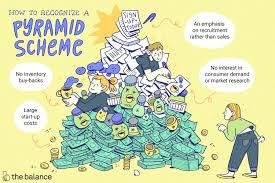Network Marketing
Network marketing is a business model that depends on person-to-person sales by independent representatives, often working from home. A network marketing business encourages you to build a network of business partners or salespeople to assist with lead generation and closing sales.
How Network Marketing Works
Network marketing is known by a variety of names, including multilevel marketing, cellular marketing, affiliate marketing consumer-direct marketing, referral marketing, or home-based business franchising.
Companies that follow the network marketing model often create tiers of salespeople. Salespeople are encouraged to recruit their own networks of salespeople. The creators of a new tier (or “upline”) earn commission on their own sales (these are sales of products or services) and on sales made by the people in the tier they created (the “downline”). In time, a new tier can sprout yet another tier, which contributes more commission to the person in the top tier as well as the middle tier.
The earnings of salespeople depend on recruitment as well as product sales. Those who got in early and are in a top tier make the most.
A good network marketing company must teach its members selling, marketing and leadership skills. It must empower its members to be better business people as opposed to the drive to make more sales and commissions alone. Members should be able to build a business through their experience in network marketing.
A Pyramid Scheme
A pyramid scheme is a business model that recruits members via a promise of payments or services for enrolling others into the scheme, rather than supplying investments or sale of products. As recruiting multiplies, recruiting becomes quickly impossible, and most members are unable to profit; as such, pyramid schemes are unsustainable. A pyramid scheme is characterized by a few people (including the creators of the scheme) making large amounts of money, while subsequent members lose money. For this reason, they are considered scams
How Pyramid Scheme Work
Pyramid schemes have existed for at least a century in different guises and the internet era has made it easy for these schemes to spread all over the world with so many people becoming victims. Websites are being created by these companies and this has made it easy for them to have a global reach. They allow those who join to create an account where they monitor their progress in the scheme through a dashboard or back office.
You may hear about a pyramid scheme from friends, family or neighbours. Usually, pyramid schemes recruit members at seminars, home meetings, over the phone, by email, or social media.
In a pyramid scheme, an organization compels individuals who wish to join to make a payment. An example of one of these schemes requires people to pay USD99 in Zimbabwe and ZAR1 500 in South Africa and a monthly subscription fee of USD99. In exchange, the organization promises its new members a share of the money taken from every additional member that they recruit. The directors of the organization (those at the top of the pyramid) also receive a share of these payments. For the directors, the scheme is potentially lucrative—whether or not they do any work, the organization’s membership has a strong incentive to continue recruiting and funneling money to the top of the pyramid.
Such organizations seldom involve sales of products or services with value. A case in point is one of these pyramid scheme which encourages its members to collect sales receipts of a particular value per month and upload these receipts on the company’s website and by so doing get paid. They claim that they are doing data collection from retails shops and this data is then sold to governments, manufacturers, investors. What members of this scheme fail to realize is that the data they are asked to collect is already being collected by organizations such as the central statistics office, retailers association, online shops, Google etc. so it’s just a bait they are using to lure people into joining the scheme
Some pyramid scheme promoters disguise their true purpose by introducing products that are overpriced, of poor quality, difficult to sell or of little value. Making money out of recruitment is still their main aim.
Without creating any goods or services, the only revenue streams for the scheme are recruiting more members or soliciting more money from current members. The behavior of pyramid schemes follows the mathematics concerning exponential growth quite closely. Each level of the pyramid is much larger than the one before it. For a pyramid scheme to make money for everyone who enrolls in it, it would have to expand indefinitely. This is not possible because not everyone has the money to join these schemes and some people are wise enough to know that it’s a scam.
When the scheme inevitably runs out of new recruits, lacking other sources of revenue, it collapses. Since the biggest terms in a geometric sequence are at the end, most people will be in the lower levels of the pyramid; accordingly, the bottom layer of the pyramid contains the most people. The people working for pyramid schemes try to promote the actual company instead of the product they are selling. For example Econet Wireless promotes its product not the company, Delta promotes its products not the company but the unfortunate thing is that people who get hooked in pyramid scheme soon get blinded to the fact that they are selling the company and not the product. These days there are many pyramid schemes in the market with no product or service to sell but the company. Since time in memorial wealth has never been acquired by selling a company but products or services.
Eventually, all of the people at the lower levels of the pyramid do not make any money; only the people at the top turn a profit. One common feature of all the people in the lower levels of the pyramid is that they are low income earners looking forward to striking it rich. People in the upper layers of the pyramid typically profit, while those in the lower layers typically lose money. Since most of the members in the scheme are at the bottom, most participants will not make any money. In particular, when the scheme collapses, most members will be in the bottom layers and thus will not have any opportunity to profit from the scheme; still, they will have already paid to join.
Looking at the above comparison of a network marketing company and a pyramid scheme you can see that pyramid scheme are dependent on their members recruiting more people to join the scheme in order to keep them going. A true network marketing company relies on its products and services for its existence it endeavors to create customers who make repeat purchases and get new customers through referrals from satisfied customers. Network marketing encourages people to earn extra income while keeping their day job.
There is need for lobbying for the enactment of laws in developing to protect citizens from pyramid schemes and to have people who start, recruit or market these schemes to be sued and face tougher penalties.
People need to realize that nowadays it’s more risky to be financially illiterate than it was in the 20th century. The internet and social media have made it easy for people to connect easily and for any information to move across the world in a short space of time. The fact that something has become popular or gone viral does not make it financially sound or a wise investment platform. People need to acquire financial intelligence and seek financial advice from the right place or from qualified people before they part with their hard earned income.

